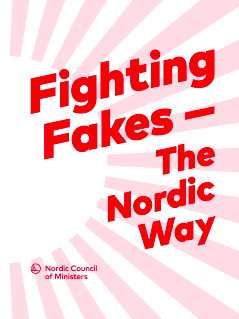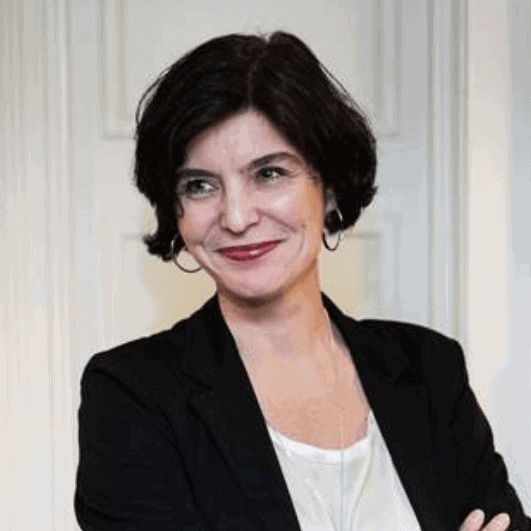If you have anything to do with business, at some point you will learn about the need to have a Unique Selling Proposition (USP). What is the USP for a newsroom?
By Kjersti Løken Stavrum

“Women over 65 years write very rude things on the internet.”
This somewhat surprising headline in Svenska Dagbladet was also the conclusion after one year of work by the Swedish network for research on hate on the internet, Nätverket Näthatsgranskaren. They too were surprised by this finding. Their best explanation was that these women are the true victims of fake news. They are not accustomed to fake journalism-like content, they are not trained in investigating the sources and, they believe in what they read.
How can professional media sustain and build crucial trust among their readers without letting fake news diluting their position? I think this is where journalism ethics as a Unique Selling Proposition (USP) has a part to play.
A USP is what your business represents. It is usually defined as a factor or consideration presented by a seller as the reason that one product or service is different from and better than that of the competitors. The Entrepreneur puts it as indisputable as this:
Before you can begin to sell your product or service to anyone, you have to sell it to yourself. This is particularly important when your product or service is similar to those offered around you.
As commented in an article on USP by The Economist; “Uniqueness is rare, and coming up with a continuous stream of products with unique features is, in practice, extremely difficult.’’
However, at a time when propaganda, misinformation, fake news and not least an increasing distrust in the established media in many countries, professional journalists should not be hesitant in communicating what they represent, what makes them professional and trustworthy. Can we apply business and public relations theory with the need for a USP in the newsroom?
Need of more willingness to correct
Across the newsrooms globally, there is little willingness among journalists to be transparent on journalistic considerations and the production processes before publishing a story. Neither do we have the willingness to correct errors promptly if we have to be honest to ourselves.
Katharine Graham, in the book Personal History touches upon this issue and the dilemmas of errors, corrections and trust. In the book, she quotes her husband Phil Graham’s speech given at the University of Michigan in 1948 when he was the publisher at the Washington Post:
The necessary haste with which we operate in the production of a daily newspaper at times leads us, despite our best care, into unavoidable errors. Critics often read into these errors entirely nonexistent malice, magnifying them as further evidence of our sins. Responsible newspapers stand ready to correct any errors as zealously as they avoid committing them (page 185).
In November 2017, Katherine Viner, the editor-in-chief in the Guardian, published an important and highly debatable essay on “A mission for journalism in a time of crisis”. Here she also writes on the issue of trust:
Trust in all kinds of established institutions — including the media — is at an historic low. This is not a blip, and it should not be a surprise, when so many institutions have failed the people who trusted them and responded to criticism with contempt. As a result, people feel outraged but powerless — nothing they do seems to stop these things happening, and nobody seems to be listening to their stories.
This has created a crisis for public life, and particularly for the press, which risks becoming wholly part of the same establishment that the public no longer trusts. At a moment when people are losing faith in their ability to participate in politics and make themselves heard, the media can play a critical role in reversing that sense of alienation.
Viner thinks it is time to rethink the role of journalists as someone who helps people, and that “journalists must work to earn the trust of those they aim to serve”.
She leaves it open for her readers — and newsrooms — to figure out how one can earn trust.
While the media business at large seems unpleasantly aware of the need to build trust, one is less clear on how and neither so keen on sticking to a vocal promise of why they are to be trusted and how the readers could hold them to account if they fail.
Leveson inquiry articulated the risk by the lack of self-regulation
A few weeks after Viner’s essay, the Guardian in February 2018 made a podcast in their series “We need to talk about…” on the future of journalism. Here the readers could pose questions to Viner, and one of them naturally pointed at the need to put media to account especially after the euro-myths that were presented to the public by the so-called establishment media prior to the referendum on Brexit.
But after the phone hacking scandal and the subsequent Leveson inquiry, it once again became obvious that the British media lacks a legitimate and well-functioning self- regulatory body. This is a challenge that is yet to be properly solved.
The contrast to the Nordic situation is striking. This can be illustrated in a recent example. The biggest commercial TV station in Norway, TV 2, recently run some stories on Russian-Norwegian relationships based on open sources obtained from the Norwegian Police Security Service which is concerned by Russian espionage. The Russian Embassy in Oslo has widely protested against the TV-coverage both on Facebook and on their homepage, accusing TV 2 and the reporter of “delivering disinformation intended to discredit neighbourly relations …” and “contributing to the atmosphere of generalised fear” and that this is “third-rate propaganda … intended to incite hatred of our country”.
In an e-mail sent to the media organizations on the matter, the editor-in-chief of TV 2, Olav Sandnes, suggested that the Russian Embassy should bring the case and their accusation forward to the Norwegian Press Council. A response demonstrating the willingness of TV 2 to be accountable, but also the privilege of offering a means of accountability, a way to complain, to the unsatisfied embassy.
Ethical principles make a difference
Just to state the obvious: there is a huge difference to the question of trust between the establishment media on those who are not. The difference is whether the media adhere to communicated, established ethical principles and a system requiring compliance to these principles. Today, most of the Nordic countries have established press complaint bodies despite that they have different structures and compositions, as well as to whom the codes of conduct adhere.
Countering accusations of disinformation by being able to refer to an established (the Norwegian system is almost 100 years’ old and often being referred to as a good example for many newly established press councils worldwide), well-structured and organized system for dealing with complaints against the media, is an advantage to the Norwegian newsrooms, the public and complainants in seven ways:
- It is predictable. In Norway, there is only one code of ethics that applies to the media, making the principles predictable and able to adhere to for reporters, sources and the public.
- The whole media business is part of it. All the media; newspapers, digital news media, magazines, radios and TVs, public and private media, respect and follow the code of ethics in their daily reporting. They respect the right of the Press Council to criticize them and their decisions to publish the judgement about the critiques. In some countries, there are different systems for the print and broadcasting media, which often leaves online media in the vacuum.
- Everyone support the press council. Media employees, owners, media organizations and the unions support and finance the Norwegian Press Association and the Press Council. Publishers, editors and journalists are actively participating in its decision-making process.
- The public has a strong voice. The press council consists of two representatives from the journalists’ union, two from the editors’ organization and three members from the public.
- It is a transparent system. The process of dealing with complaints is open and transparent. The meetings of the council are live streamed. Both the complainant and the public can follow the delivery of the judgement.
- It is documented. The documentation, the files and the archives of all the cases that have been tried by the press council are easily accessible for all on the internet.
- It’s free and efficient.
It is, therefore, natural to assume that a strong and established self-regulatory system makes the media more accountable in their daily reporting when knowing that their work can be brought to the press council. It is also a fact in Norway that experienced sources, most skilled PR or information officers in the public and private sectors are well aware of the code of ethics, its intentions and obligations. It provides a common ground for these people working in different, sometimes controversial environment.
Making a promise is always a risky business. Stating what one stands for, and sticking to it, might be likewise risky. Fighting a devastating war against fake news, distrust and trolls with a soft gun of lofty words will not bring victory to professional journalism.
To be able to differentiate journalism from all that is not, voicing ethical obligations and accountability can be vital. But it is not sufficient. The final quest for the power of journalism will always be the day-to-day reporting, the fairness, accuracy and the ability to stay relevant to our audience.
You can find the rest of the booklet on fighting fake news from the Nordic Council of Ministers here. The original article was published on Medium and has been republished with permission.
Kjersti Løken Stavrum

Kjersti Løken Stavrum is a member of the Ethical Journalism Network’s board of trustees and is CEO of the Tinius Trust, the largest shareholder of the global media group Schibsted. The trust’s main role is to ensure that Schibsted remains a media group characterised by free, independent, quality journalism.
Kjersti has been journalist and editor for more than 25 years for newspapers, magazines and online publications. She was secretary general of the Norwegian Press Association from 2013-2016. For a short period, she was head of the communications department of the Confederation of Norwegian Enterprise (NHO).
She is educated as political scientist specialising in international relations, and has a masters degree in management.
In 2003, Løken Stavrum was named Norway’s Female Media Leader of the Year in recognition for her success in making KK (Kvinner og Klær) Norway’s most popular women’s magazine.